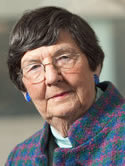Senior adult oncology: Clinical practice guidelines in oncology Journal Article
| Authors: | Hurria, A.; Browner, I. S.; Cohen, H. J.; Denlinger, C. S.; DeShazo, M.; Extermann, M.; Ganti, A. K. P.; Holland, J. C.; Holmes, H. M.; Karlekar, M. B.; Keating, N. L.; McKoy, J.; Medeiros, B. C.; Mrozek, E.; O'Connor, T.; Petersdorf, S. H.; Rugo, H. S.; Silliman, R. A.; Tew, W. P.; Walter, L. C.; Weir, A. B. 3rd; Wildes, T. |
| Article Title: | Senior adult oncology: Clinical practice guidelines in oncology |
| Abstract: | Cancer is the leading cause of death in women and men aged 60 to 79 years. The biologic characteristics of certain cancers are different in older patients compared with their younger counterparts, and older patients also have decreased tolerance to chemotherapy. Nevertheless, advanced age alone should not be the only criteria to preclude effective cancer treatment that could improve quality of life or lead to a survival benefit in older patients. Treatment should be individualized based the nature of the disease, the physiologic status of the patient, and patient preferences. Chronologic age is not reliable in estimating life expectancy, functional reserve, or the risk of treatment complications. Whether cancer treatment is appropriate may be best determined through careftil assessment of the older patient. CGA can be used to assess life expectancy and risk of morbidity from cancer in elderly patients, in turn enabling physicians to develop a coordinated plan for cancer treatment and guide interventions tailored to the patient's problems. © JNCCN-Journal of the National Comprehensive Cancer Network. |
| Keywords: | functional assessment; lenalidomide; prednisone; thalidomide; constipation; fatigue; neutropenia; review; salvage therapy; sorafenib; bevacizumab; doxorubicin; fluorouracil; sunitinib; cancer combination chemotherapy; drug dose reduction; drug efficacy; drug withdrawal; capecitabine; paclitaxel; cancer adjuvant therapy; cancer radiotherapy; primary central nervous system lymphoma; methotrexate; temozolomide; drug megadose; nutritional status; colorectal cancer; medical decision making; carboplatin; unindexed drug; low drug dose; metastasis; quality of life; bortezomib; infection; multiple myeloma; nephrotoxicity; breast cancer; anemia; bone marrow suppression; heart disease; lung non small cell cancer; lung resection; nausea; neuropathy; stomatitis; delirium; nccn clinical practice guidelines; cyclophosphamide; dexamethasone; melphalan; deep vein thrombosis; practice guideline; oncology; bladder cancer; cetuximab; docetaxel; temsirolimus; asthenia; drug fever; prostate cancer; social status; social support; depression; urine incontinence; cardiotoxicity; glioblastoma; partial mastectomy; cystectomy; dementia; comorbidity; daunorubicin; brachytherapy; bleomycin; cognition; distress syndrome; vision; osteoporosis; external beam radiotherapy; idarubicin; hearing; kidney cancer; trastuzumab; anthracycline; oxaliplatin; frail elderly; mental health; everolimus; cytopenia; head and neck carcinoma; polypharmacy; geriatric assessment; venous thromboembolism; older patient; nccn guidelines; randomized controlled trial (topic); recombinant interferon; phase 3 clinical trial (topic); falling; cancer treatment; advanced age; cabazitaxel; home environment; comprehensive geriatric assessment; senior adult elderly |
| Journal Title: | Journal of the National Comprehensive Cancer Network |
| Volume: | 10 |
| Issue: | 2 |
| ISSN: | 1540-1405 |
| Publisher: | Harborside Press |
| Date Published: | 2012-02-01 |
| Start Page: | 162 |
| End Page: | 209 |
| Language: | English |
| PROVIDER: | scopus |
| PUBMED: | 22308515 |
| PMCID: | PMC3656650 |
| DOI/URL: | |
| Notes: | --- - "Export Date: 2 April 2012" - "Source: Scopus" |





